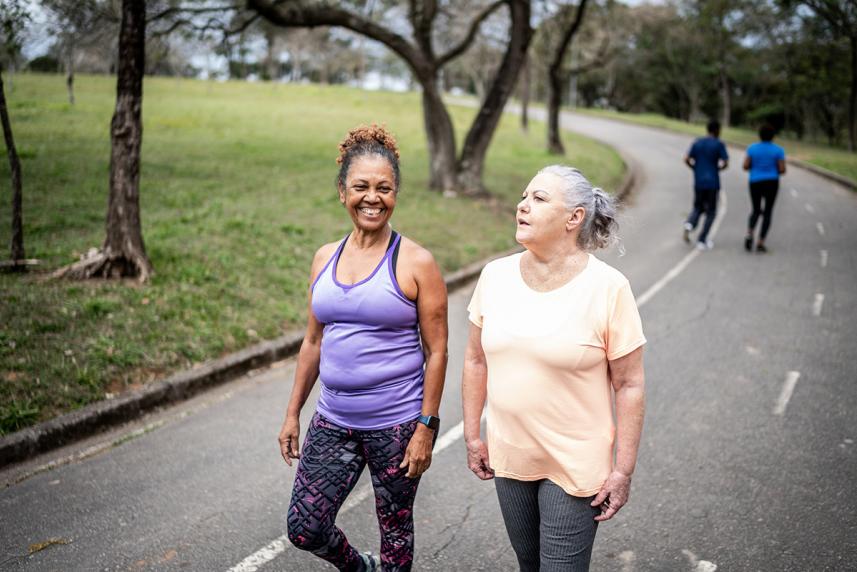
Aetna® care teams can help you find a doctor, schedule appointments, manage a condition, access the right benefits and more. It’s a personal benefit designed for Aetna Dual Eligible Special Needs Plan members.
Your walks should be all about the benefits, not worrying about sneaky tripping hazards, overheating or worse. Use these smart tips to stay safe while you walk your way to wellness.

Walking may be the most underrated form of exercise. That’s because many people don’t know it can do so much more than improve fitness and heart health. Walking can help boost mood and energy. It can also ease pain and lower your risk for cancer and chronic diseases.*
“Walking is the best form of exercise — it’s what your body was designed to do,” says Pete McCall, MS. He’s the founder of All About Fitness Education Solutions, based in San Diego.
Walking outside also gives you the added perks of fresh air and natural light. Still, walking is not risk-free. It can raise your chance of falling, for starters. Most injuries from falls are minor, such as cuts, scrapes and bruises. But one out of five falls cause more serious injuries, such as broken bones or head injuries.* And when the weather is hot, you need to think about overheating or becoming dehydrated too.*
The good news: You can stay safe while you stride with a little planning. Check out these tips before you step out, and then put them to good use.

Aetna® care teams can help you find a doctor, schedule appointments, manage a condition, access the right benefits and more. It’s a personal benefit designed for Aetna Dual Eligible Special Needs Plan members.
It’s up to you what type of shoes you pick. Walking shoes, running shoes or trainers are all great options. Are you walking on an uneven surface, such as a trail in the woods? If so, think about wearing high-top trail shoes or hiking boots. They can help support your ankles.
Whatever shoes you choose, just make sure they check these boxes:
Put on comfortable clothes in breathable fabrics that “wick” or pull moisture away from the skin, says Fabio Comana. He’s an instructor with the National Academy of Sports Medicine. This will help remove heat, through sweat, from your body.
Some workout clothes also have sunblock built into the fabric. That offers your skin some protection from UV rays. But it’s still important to use sunscreen on areas your clothing doesn’t cover.
Start with a pace that feels comfortable. Aim to walk a mile, or for 20 minutes at that pace, even if you need to take breaks. (If that’s too challenging right now, or if you don’t have 20 minutes, that’s okay — do what you can.)
Then safely ramp up the challenge over time. You can do that by increasing how fast or how long you walk by 10 percent per week. For example, you might walk 20 minutes at a time the first week. In that case, bump up your walks to 22 minutes the next week. It helps to use a fitness tracker or an app on your phone to track your pace, McCall says.
One of the biggest tripping hazards is not paying attention to what’s on the path in front of you. It’s easy to focus more on talking to a friend or listening to music, McCall warns.
To be safe, always keep your eyes on the ground 3 to 4 yards (9 to 12 feet) ahead of you. Watch out for cracks in the pavement, rocks and sticks on the road or moisture or moss on trails. “Parks, sidewalks and marked trails are a safer choice than forging your own path,” says Comana.
Drink at least 8 ounces of water before you head out. And drink an extra 8 ounces when you come back, McCall advises. This should be enough if you’re walking for less than 30 minutes.
If it’s very hot and humid, or if you’re walking for 40 minutes or longer, bring a water bottle and sip as you go. Planning to walk for 60 minutes or longer? Mix a sports drink into your water. That will help replace electrolytes (key minerals like sodium and potassium) that you can lose through sweat.
Different medications can affect your walking in various ways, says Patrick J. Maloney, MD. He’s a board-certified orthopedic surgeon at Mercy Medical Center in Baltimore. Some examples:
“Speak to your primary care provider before beginning any new exercise routine,” says Dr. Maloney. When you do, ask about how your medications might affect your hydration levels, sun sensitivity, response to exercise and balance.
If you qualify for both Medicare and Medicaid, you may be eligible for an Aetna® Dual Eligible Special Needs Plan (D-SNP).
If you're 65 or older and have diabetes or an eligible heart disease, you may qualify for an Aetna® Chronic Condition Special Needs Plan (C-SNP). C-SNPs are currently available in select counties in IL and PA.
You may be eligible for an Institutional Special Needs Plan (I-SNP) if you’ve lived (or plan to live) in a participating facility for 90+ days or you have Medicare Part A (hospital insurance) and Part B (medical insurance).
*FOR THE HEALTH BENEFITS OF WALKING: Mayo Clinic. Walking: trim your waistline, improve your health. May 19, 2021. Accessed September 17, 2024.
*FOR THE LINK BETWEEN FALLS AND INJURY: Centers for Disease Control and Prevention. Facts about falls. May 12, 2023. Accessed September 17, 2024.
*FOR THE IMPORTANCE OF HYDRATION: Mayo Clinic. Walking: trim your waistline, improve your health. May 19, 2021. Accessed September 17, 2024.
*FOR HOW BETA BLOCKERS AFFECT EXERCISE: Sheps SG. Mayo Clinic. Beta blockers: How do they affect exercise? January 13, 2022. Accessed September 17, 2024.
*FOR LINK BETWEEN MEDICATIONS AND DEHYDRATION: Dalleck LC. American Council on Exercise. How common medications may affect your clients’ exercise programs. June 2013. Accessed September 17, 2024.
*FOR LINK BETWEEN MEDICATIONS AND DEHYDRATION: Mayo Clinic. Dehydration. September 19, 2019. Accessed September 17, 2024.
*FOR LINK BETWEEN MEDICATIONS AND SKIN SENSITIVITY: U.S. Food & Drug Administration. The sun and your medicine. September 25, 2015. Accessed September 17, 2024.
Aetna Medicare is a HMO, PPO plan with a Medicare contract. Our DSNPs also have contracts with state Medicaid programs. Enrollment in our plans depends on contract renewal.
See Evidence of Coverage for a complete description of plan benefits, exclusions, limitations and conditions of coverage.
Plan features and availability may vary by service area. Participating health care providers are independent contractors and are neither agents nor employees of Aetna. The availability of any particular provider cannot be guaranteed, and provider network composition is subject to change.
Eligibility for the Model Benefit or Reward and Incentive (RI) Programs under the Value-Based Insurance Design (VBID) Model is not assured and will be determined by Aetna after enrollment, based on relevant criteria (e.g., clinical diagnoses, eligibility criteria, participation in a disease state management program).
For mail-order, you can get prescription drugs shipped to your home through the network mail-order delivery program. Typically, mail-order drugs arrive within 14 days. You can call the phone number on your member ID card if you do not receive your mail-order drugs within this timeframe. Members may have the option to sign-up for automated mail-order delivery.
To send a complaint to Aetna, call the plan or the number on your member ID card. To send a complaint to Medicare, call 1-800-MEDICARE (TTY users should call 1-877-486-2048), 24 hours a day/7 days a week. If your complaint involves a broker or agent, be sure to include the name of the person when filing your grievance.
For accommodation of persons with special needs at meetings, call 1-833-258-3132 (TTY: 711).
The benefits mentioned are part of special supplemental program for the chronically ill. Eligibility is determined by whether you have a chronic condition associated with this benefit. Standards may vary for each benefit. Conditions include Hypertension, Hyperlipidemia, Diabetes, Cardiovascular Disorders, Cancer. Other eligible conditions may apply. Contact us to confirm your eligibility for these benefits.
Nondiscrimination Notice | CA-Specific Nondiscrimination Notice
©2025 Aetna Inc.
Y0001_3938466_2025_M
3957033-03-01
Call us at 1-844-514-8290 (TTY: 711) between 8 AM and 8 PM, Monday to Friday. Or visit AetnaMedicare.com/YourDSNP anytime.